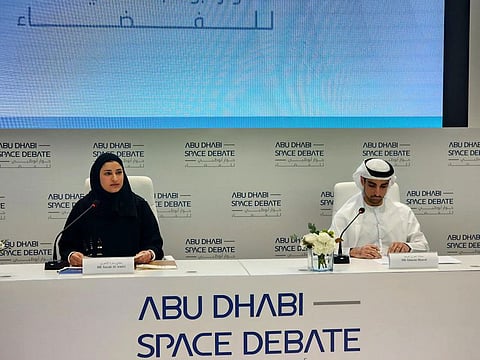UAE to advocate for peaceful, collaborative space activity at upcoming Abu Dhabi Space Debate
Two-day conference will see participation of global experts, world leaders

Abu Dhabi: The UAE is a leading Arab country in the space sector, and as it expands its footprint, the nation is also advocating for peaceful and sustainable space activity, top officials said at a press conference in the capital on Thursday (November 17).
Towards that end, the upcoming Abu Dhabi Space Debate will deliberate on how the space sector can contribute further to development, climate action, water sustainability and technological advancement. It will also see experts review existing laws and legislation so that progress can be accelerated.
“We’ve seen the space sector go from an area that was accessible to two major nations to a field in which nearly 70 nations have become players, in addition to numerous private companies. The UAE is therefore playing a crucial role in ensuring that countries move away from the competitive ‘space race’ and instead work collaboratively to use space research and technology to improve human life,” said Omran Sharaf, UAE Assistant Foreign Minister for Space and Technology Affairs.
UAE milestones
Addressing the media, Sarah Al Amiri, UAE Minister of State for Public Education and Advanced Technology, and the chairperson of the UAE Space Agency, said the UAE now has 19 satellites orbiting Earth, with 10 more under development.
“The UAE has already become the fifth country to reach the Mars orbit, and is one of four nations that have announced plans to reach the orbit of Venus, and to explore the asteroid belt beyond Mars, in a mission that is scheduled for launch in 2028. Our nation boasts more than 50 space companies and institutions, and has about 3,000 space experts. There are also more than five space research centres, and three universities with space programmes,” Al Amiri said.
Revenues in the global space sector are expected to reach $1 trillion (Dh3.67 trillion) by 2040, and this is expected to drive growth and innovation in the industry. Earlier this year, the UAE Space Agency announced a new Dh3 billion national investment and development fund for the space sector, The National Space Fund.
Need for coordination
Sharaf, who is heading the United Nations Committee on the Peaceful Uses of Outer Space, and is the chief of the Emirates Mars Mission, said the UAE has already demonstrated its desire to drive forward research and coordination in space.
“When we embarked on the Emirates Mars Mission, His Highness Highness Sheikh Mohammed bin Rashid Al Maktoum, Vice President, Prime Minister and Ruler of Dubai, directed us not to start from scratch. He told us to develop on the existing technology, which reduced costs and sped up development while minimising risks. This helped us propel the technology forward quicker, which is our goal,” he said.
“The space sector is today feeding into the development of many other sectors, including technology, climate actions and sustainability. This creates a need to ensure that it is not exploited, and the topic will be a key part of the discussion at the Abu Dhabi Space Debate,” the official said.
The solutions and accountability for space debris, the links between the space sector and other industry, the geopolitics of space, and the need for updated legislations, will be some of the other topics of interest at the two-date conference.
